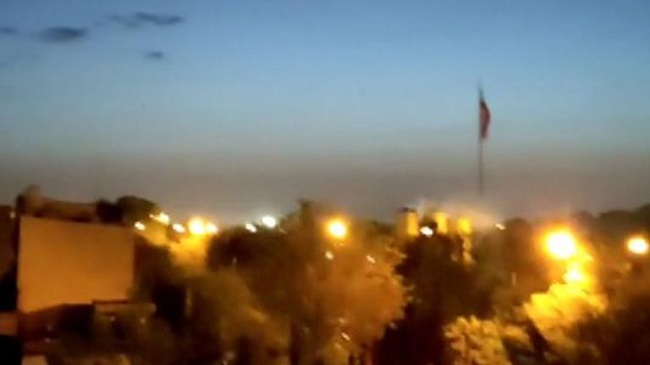US officials, on Friday, said Israel hit Iran with a missile overnight in what appears to be a retaliatory strike after weeks of escalating tensions between the two countries.
However, there are competing claims about the scale of the attack on the Isfahan region and the extent of any damage, with Iranian state media downplaying its significance.
It comes after weeks of soaring tensions between the regional rivals, which have already seen an Israeli attack on an Iranian compound in Syria, and Iran launch an unprecedented assault against Israel.
How do we know there has been a strike?
Israel does not routinely confirm its military actions, which have targeted Iranian-backed armed groups in Syria and Iraq on many occasions.
However, US officials have confirmed that an Israeli missile hit Iran in the early hours of Friday.
It is unclear what type of weapons were used or where they were launched from.
US sources said a missile was involved in the attack, while Iran said it had involved small drones.
Iran’s government tightly controls access to the country.
What did Iran say about the strike?
Iranian officials and media have confirmed there was an attempted strike but are downplaying the significance of it. There have been no reports of casualties.
Iran’s Fars news agency said explosions were heard near an army base and air defence systems were activated.
A state media channel quoted a general in Isfahan as saying explosions heard in the area were “due to air defence firing at suspicious objects”, and saying there had been no damage.
Iran’s semi-official Tasnim news agency, which is close to Iran’s powerful Islamic Revolution Guard Corps military wing, posted a video of a nuclear facility in Isfahan which did not show any signs it had been hit.
The International Atomic Energy Agency has confirmed there has been no damage to Iran’s nuclear sites.
Hossein Dalirian, a spokesman for Iran’s National Centre of Cyberspace, said there was “no air attack from outside borders”.
He said Israel had “only made a failed and humiliating attempt to fly quadcopters [drones] and the quadcopters have also been shot down”.
Iran imposed restrictions on commercial flights in the hours immediately after the strike but they have now been lifted.
Explosions were also reported in Iraq and Syria – where armed groups backed by Iran operate – overnight, but it is unclear if they were directly linked to the Isfahan strike.
The Syrian defence ministry said an air defence site in the south of Syria was hit by an Israeli missile in the early hours of Friday morning local time. Israel has not confirmed it was behind the strike.
Why was Isfahan targeted?
Isfahan province is a large area in the centre of Iran which takes its name from its largest city.
The region is home to significant Iranian military infrastructure, including a large airbase, a major missile production complex and several nuclear facilities.
This latest strike comes less than a week after Iran launched hundreds of missiles and drones at Israel, an incident seen as a dramatic escalation in tensions.
Despite its vast scale and unprecedented nature, Iran’s attack was largely unsuccessful, with the vast majority of projectiles shot down by Israeli air defences with the help of the US, UK and other allies.
That unprecedented attack on Israeli soil was in response to a strike against a building on an Iranian diplomatic compound in Syria on 1 April.
Israel has not publicly confirmed it was behind that strike either, but it is widely accepted that it was.
What has the reaction in Israel and around the world been?
Some of the responses from within Israel have highlighted the country’s political divisions.
Ultranationalist Security Minister Itamar Ben Gvir described the strike on Iran as “feeble” or “lame”.
In response, Israeli opposition leader Yair Lapid called for him to be sacked, and said his remark had ridiculed and embarrassed Israel.
The UK government said it would not speculate on the strike, but said Israel should avoid “significant escalation” while exercising its “right to self-defence”.
European Commission President Ursula von der Leyen called on all sides to refrain from further action.
ALSO READ THESE TOP STORIES FROM NIGERIAN TRIBUNE
Tinubu’s reforms yielding results — Alake
